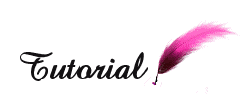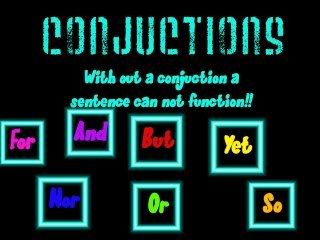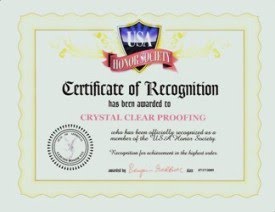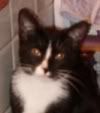
A conjunction joins words, phrases, clauses, or sentences. I think we all know the most common conjunctions and when to use them; and, but, for, or, yet, and so. But here are two conjunctions that always confuse people.
When should you use or and when should you use nor?
Don't let these guys trick you. Remember this simple rule and you'll never be confused again.
When using the word either, us or. They both start with vowels. When using the word neither, use nor. They both start with "n."
Examples:
We had to decide if we were going to either the movies or to dinner.
My boss had neither the time nor the patience to listen to Bill's complaining.
Beginning a Sentence with a Conjunction
Just as there is widespread belief that you should not end a sentence with a preposition, there is also no historical or grammatical foundation that you should not begin a sentence with a coordinating conjunction.
A coordinating conjunction you'll remember is for, and, nor, but, or, yet, so. Once again, I could find no substantial evidence that beginning a sentence with a conjunction is an error and is mainly taught to avoid writing fragmented sentences.
If you decide to begin a sentence with a coordinating conjunction, keep these points in mind:
– Be sure that a main clause follows the coordinating conjunction.
– Use a coordinating conjunction only when it makes the flow of your ideas more effective.
– Do not use a comma after the coordinating conjunction. Coordinating conjunctions are not considered transitional expressions like in addition and for instance.
– But used as an adversative conjunction can sometimes be unclear at the beginning of a sentence. You'll need to evaluate whether the but in question contradicts the preceding statement and see whether and is really the word you want. If and can be substituted, then but is almost certainly the wrong word.
Examples:
He went to work this morning. But he left his briefcase at home.
Between those sentences is an indirect idea, since the two actions are in no way contradictory. What is implied is something like this:
He went to work, intending to give a presentation, but he left his briefcase behind.
Because and would have made sense in the original statement, but is not the right word.
Correct: He went to work this morning. And he left his briefcase at home.
Of course there are other options for structuring this sentence; however this post being about conjunctions, the example uses only conjunctions.

Source: Grammar Done Right!

































































Thanks! Great post. I always get those confused.
ReplyDeleteWhenever I hear the word "conjunction," I recall (fondly) Schoolhouse Rock's classic, "Conjunction Junction, What's Your Function?"
ReplyDeleteI so agree with Alan. Schoolhouse Rock always comes to mind. Great post. Always find great information here and reminders of what I should remember.
ReplyDeleteMason
Thoughts in Progress
Gosh!! Thank you for posting this! All very helpful and done in a way that I can understand (and that's a miracle in my case!).
ReplyDeleteTake care
x
Christine: Great! I'm glad to have helped! :)
ReplyDeleteAlan: I knew that one would be coming at some point today...thanks a lot. Now it's in my head and no doubt will remain there all day. La la la la la...
Mason: LOL! There I go again - la la la la la.... Thanks for the compliment! I'm so glad that's how you think of this blog!
Old Kitty: You're welcome! Thank you as well for the compliment. My goal is to share information in a way that makes sense and is easily (hopefully) understood. I know I've succeeded when I get comments like yours. :)
Such great tips here. I'm bad about starting sentences with 'and' or 'but', so I try to edit them out on each pass I make. My 'buts' are nearly always wrong.
ReplyDeleteARGH! Alan got me singing the Schoolhouse Rock song! Oh nooooo.... :)
ReplyDeleteCrystal, thanks so much for these tips. I'm tweeting them!
Crystal; Thanks for the reminder and the wonderful examples.
ReplyDeleteCarol: Thanks for stopping by! It's so rewarding for me to know that my posts are helpful!
ReplyDeleteElizabeth: Right? That song is STILL in my head! Thanks for the tweet!
Elspeth: Always a pleasure seeing you here! Glad the examples help!
Thanks for making it so clear.
ReplyDeleteHowever, that is what you do!
NOT going to be confused by this tutorial! (wink)
ReplyDeleteNeither will I forget your post nor will I get the School House Rock song out of my head for days. Thanks! :)
ReplyDeleteAs always your posts are invaluable! So glad you're back!!
ReplyDeleteVery informative post, as always! You probably covered this in an earlier post which I missed, but are you saying it's okay to end a sentence with a preposition? I just totally rearranged a sentence in my wip today to avoid ending it with a preposition.
ReplyDeleteGood stuff, Crystal! And now, everybody sing "Conjunction Junction, what's my function?"
ReplyDeleteLOL! Now that everyone has that song in their heads, thank you all for stopping by!
ReplyDeleteChris: Aww..thanks for the "welcome back!"
Susan: While it's fine to begin a sentence with a conjunction (as long as it's done correctly), it is NOT advisable to end a sentence with one unless absolutely necessary.
Those pesky conjunctions...
ReplyDeleteSo glad you're back!
Michele
Thank you, Crystal. And it's so nice to have you back!
ReplyDelete(I just had to show off my new conjunction knowledge)